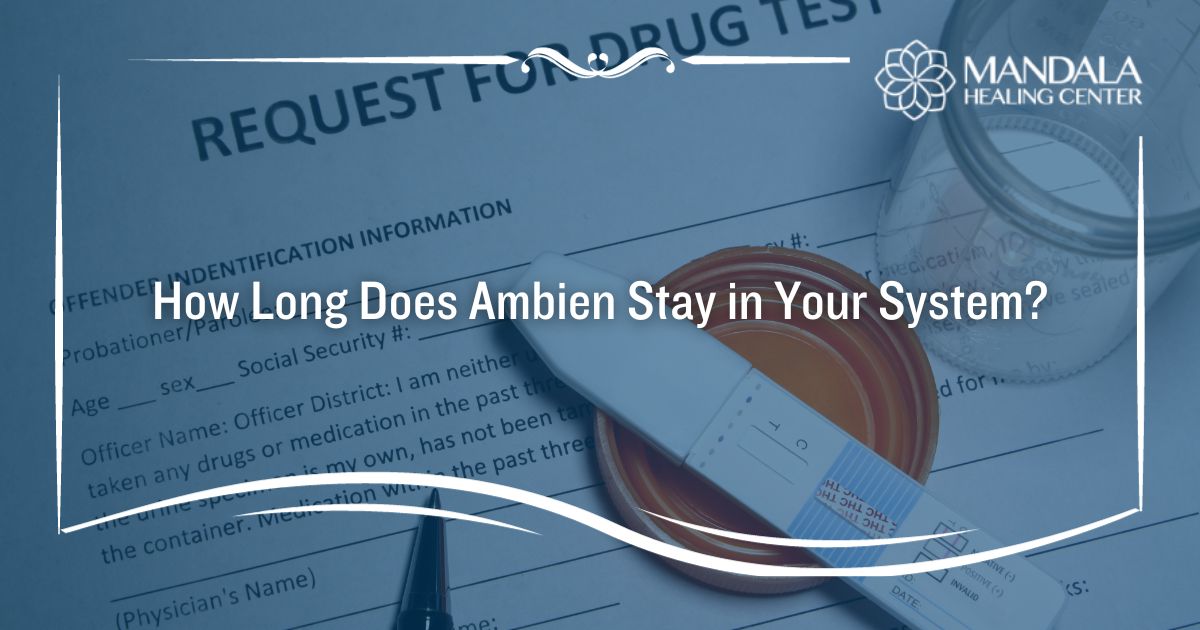Ambien is the brand name for zolpidem, a prescription sleeping medication that belongs to the sedative-hypnotic class of drugs. By producing a calming effect on your brain and body, Ambien can improve the symptoms of insomnia. However, it is intended to be taken only short term because Ambien can be habit-forming.
According to the Substance Abuse and Mental Health Services Administration (SAMHSA), about 900,000 people were estimated to be abusing zolpidem in 2017.[1]
Unfortunately, misusing Ambien in any manner, whether you are taking higher doses of it or taking it longer than you were intended to, can lead to a substance use disorder. If you are addicted to Ambien, you might find yourself wondering how long it stays in your system.
Typically, Ambien remains in your body for up to 15 hours. However, it could leave behind metabolites in your system that will be detected by drug tests for a more extended period.
What are Ambiens Effects?
The primary effect of Ambien is to induce sleep among people suffering from insomnia. By slowing down activity in the brain, it can help people fall asleep faster and sleep longer. However, many people abuse Ambien because of the drowsiness it can cause.
The side effects of Ambien may include:[2]
- Dizziness and drowsiness
- Tiredness
- Headaches
- Lightheadedness
- A “drugged” feeling
- Unsteady gait and coordination issues
- Nausea
- Constipation or diarrhea
- Gas and heartburn
- Stomach pain
- Changes in appetite
- Uncontrollable shaking of the body
- Unusual dreams
- Somnambulism (sleepwalking)
Ambien has a rapid onset of action, which means the effects can begin within 30 minutes. This is why doctors recommend their patients not to take Ambien until they are about to go to sleep.
One of the main risks of taking Ambien is sleepwalking. Many people have engaged in risky behaviors while sleepwalking on the medication, such as attempting to drive cars. Thankfully, these behaviors will subside once Ambien’s use is discontinued.
How Long Does Ambien Stay in Your System?
Ambien will affect you very quickly, often in as little as 30 minutes. Typically, the peak effects will begin 1 to 2.5 hours after you consume it. However, this depends on whether you are taking the immediate or extended-release formulation.
Even further, Ambien has a half-life of 2.5 to 3 hours, meaning half of it will be eliminated from your system at this time.[3] Typically, it takes 4 to 5 half-lives for a drug to be completely removed from your body. In other words, it can take up to 15 hours for your system to eliminate Ambien.
While Ambien usually leaves the body after 15 hours, this can vary from person to person. For example, someone with a fast metabolism might eliminate Ambien quicker than a person with a slower one.
Other factors that can influence how long Ambien stays in your system include:
- Age
- Gender
- Weight
- Health of the liver and kidneys
- Speed of metabolism
How Long Can Drug Tests Detect Ambien?
Ambien will not show up on your standard drug test. Normal drug panels show substances like amphetamines, opioids, benzodiazepines, and THC. However, there are specialized drug panels people can use to determine whether you have been abusing Ambien.
How long Ambien is detectable on a drug test depends on the type of test being used.
Urine
Urine tests are the most popular type of drug test because they are minimally invasive and relatively cheap. With that being said, specialized urine drug panels can detect Ambien for up to 72 hours after the last dose.
Saliva
Saliva tests are not commonly used to detect Ambien, as they provide a short window of time. Keeping this in mind, saliva tests can begin to detect zolpidem 15 minutes after it is ingested and for up to 8 hours after the last dose.
Blood
Blood tests are most commonly used in hospitals to determine if a medication is contributing to the symptoms you are experiencing. Drug tests can detect Ambien in your blood for 10 to 14 hours after the last dose.
Hair
Hair tests are not commonly used to detect Ambien because they are expensive to send off to the lab. With that being said, they can detect any drug in your hair follicles for up to 3 months after your last dose, including Ambien.
Find Help for Ambien Abuse and Addiction
If you or a loved one frequently abuses Ambien, you could be struggling with a substance use disorder. Long-term Ambien abuse can lead to a variety of adverse health effects, including worsened insomnia over time. As a result, you should always seek help from a professional drug rehab center.
At Mandala Healing Center, we can offer you compassionate, clinically proven, and highly effective treatment for Ambien addiction. Contact us today for more information on how to get started.
References:
- The Substance Abuse and Mental Health Services Administration (SAMHSA): RESULTS FROM THE 2017 NATIONAL SURVEY ON DRUG USE AND HEALTH: DETAILED TABLES, Retrieved November 2023 From https://www.samhsa.gov/data/sites/default/files/cbhsq-reports/NSDUHDetailedTabs2017/NSDUHDetailedTabs2017.pdf
- Medline Plus: Zolpidem, Retrieved November 2023 From https://medlineplus.gov/druginfo/meds/a693025.html
- The Food and Drug Administration (FDA): Ambien Label, Retrieved November 2023 From https://www.accessdata.fda.gov/drugsatfda_docs/label/2016/019908s037lbl.pdf












